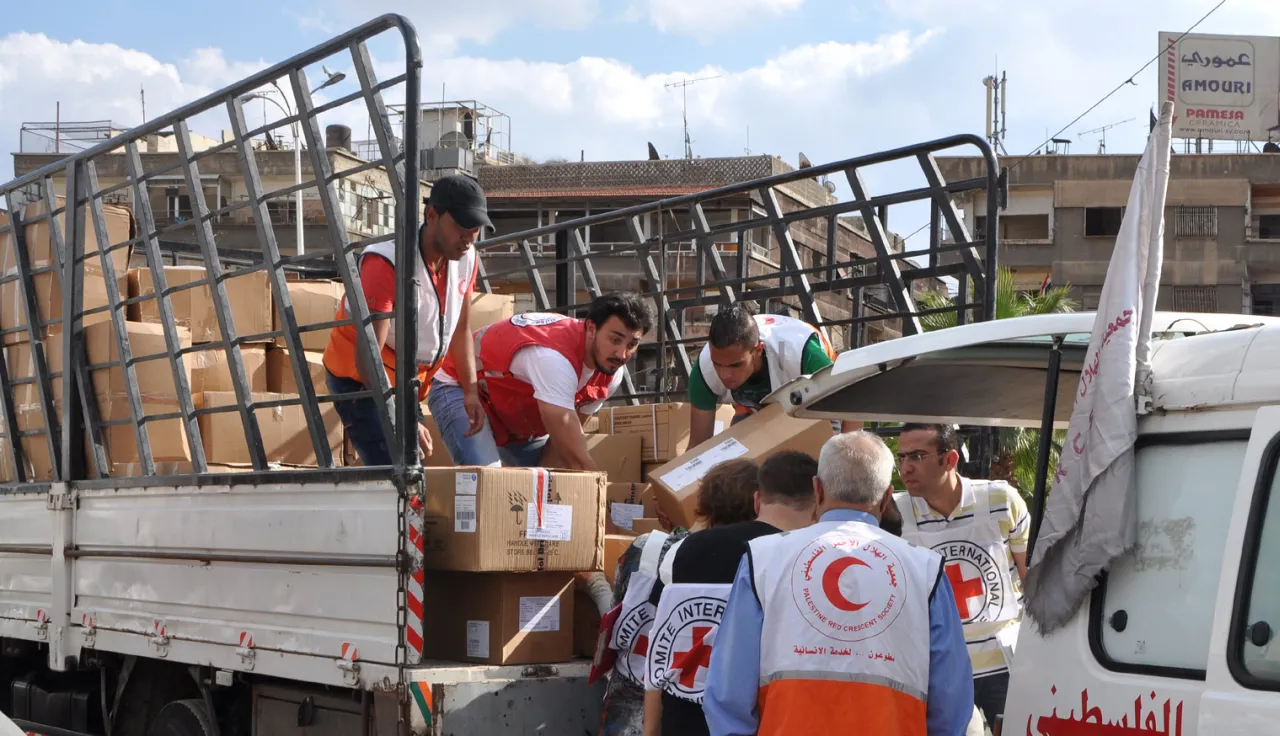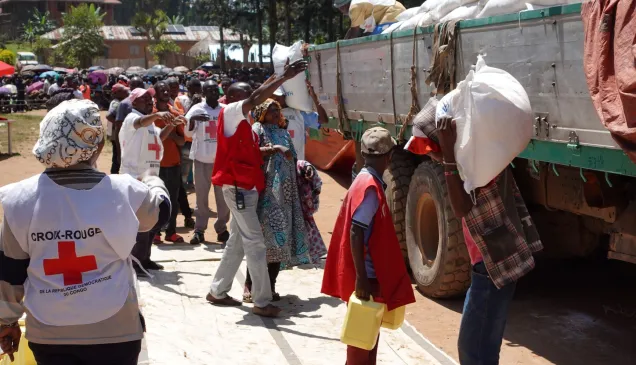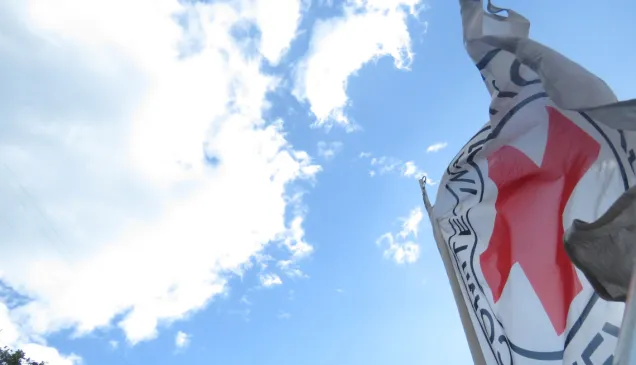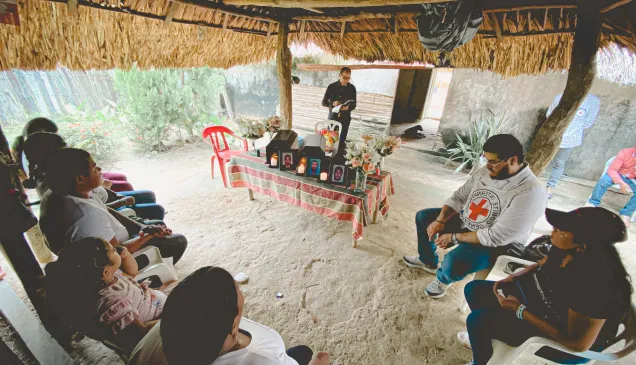The ICRC and the Syrian Arab Red Crescent continue to provide millions of Syrians in both government- and opposition-held areas with emergency relief and clean water. Last month, after receiving government approval to deliver aid across front lines, the ICRC substantially increased its assistance to health-care facilities in opposition-held territory.
"The relief aid we were able to deliver in October made a difference for thousands of patients. This is definitely a small step in the right direction," said Avril Patterson, the ICRC's health coordinator in Syria. "Nevertheless, access to basic health care remains very limited for many people in the country. As fighting continues unabated, we are urging all parties to the conflict to protect and facilitate the work of health-care personnel so that they can carry out their life-saving work in safety."
The ICRC had been seeking access to Yarmouk camp, a Damascus neighbourhood heavily affected by fighting, for over a year. On 16 October, after being given the go-ahead by the Syrian authorities and other parties, a convoy jointly organized by the ICRC, the Syrian Arab Red Crescent and the Palestine Red Crescent Society entered the buffer zone leading into the camp, where it delivered a three-month supply of medicine to treat over 5,000 people suffering from chronic diseases such as diabetes and heart disease. The ICRC coordinated the operation with parties both inside and outside the camp to ensure the security of the personnel involved. In addition to the medicines, blankets, towels, bedsheets, gloves and scissors were delivered directly to Palestine Red Crescent doctors working in the camp.
A few days later, on 19 October, the ICRC and the Syrian Arab Red Crescent reached the besieged opposition-held neighbourhood of Al Waer, in Homs, where another three-month supply of chronic disease medicine for over 5,000 patients was delivered to local relief committees. The health-care situation in Al Waer, which has seen heavy fighting in recent months, remains difficult for thousands of residents.
On 23 October, a 39-truck convoy organized jointly by the ICRC and the Syrian Arab Red Crescent delivered emergency food rations and other relief items in the opposition-controlled towns of Manbij, Al Bab, Maskaneh, Jarablos and Deir Hafer in eastern rural Aleppo. The emergency relief was immediately distributed to over 95,000 people, many of whom have been displaced by the fighting. On 28 October, Aleppo-based Syrian Arab Red Crescent volunteers crossed the city's front lines to deliver crutches, wheelchairs and bandages to warehouses in the opposition-held area of Jisr Al Hajj. These supplies were distributed to four local physiotherapy centres.
On 30 October, ICRC water and sanitation engineers accompanied by Syrian Arab Red Crescent and Palestine Red Crescent personnel delivered water purification tablets to Palestine Red Crescent representatives within Yarmouk camp. The Red Crescent and the camp authorities are struggling to provide clean water for all residents because of a lack of water-treatment chemicals and other supplies needed to properly maintain local water networks. Once diluted in the water supplied by four local wells, the tablets ensure that over 50,000 people have clean water for a month. This was the first time ICRC engineers had entered the buffer zone leading into Yarmouk. The operation was coordinated with all parties.
The ICRC is not currently present in Ayn Al Arab/Kobani, where heavy fighting is limiting civilian access to water, food and health care. However, Syrian Arab Red Crescent volunteers have provided thousands of people displaced near the Turkish border with water, food and other emergency relief. Over 200,000 people are estimated to be living in conditions of great hardship in the border area.
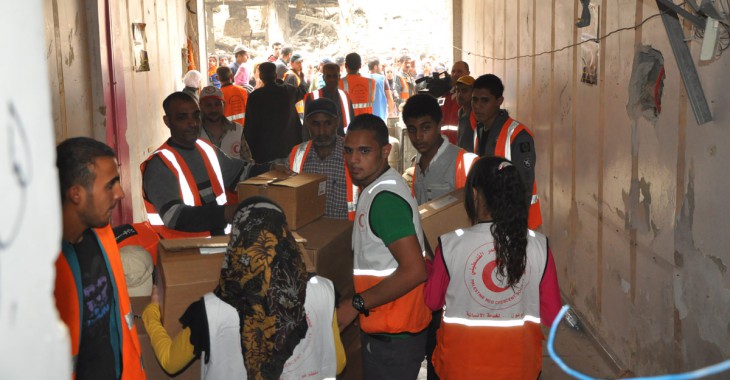
Damascus. Syrian Arab and Palestinian Red Crescent volunteers and the ICRC deliver medicines in a coordinated effort in Yarmouk camp. © SARC/Vivian Toumeh
Facts and Figures – October 2014
The ICRC currently has over 300 staff working in Damascus, Aleppo and Tartus, where they are endeavouring to distribute food, restore the water supply, improve health care and re-establish contact between people separated by the conflict.
Emergency aid
In October, the ICRC:
- supplied food to over 470,000 people, most of them displaced by the fighting, in 10 governorates: Damascus, Rural Damascus, Suweida, Quneitra, Dara'a, Homs, Hama, Tartus, Lattakia and Aleppo;
- supplied nearly 10,000 people living in temporary shelters in Homs and Lattakia with daily meals through collective kitchens supported by the Syrian Arab Red Crescent;
- provided over 140,000 other people displaced by the fighting with hygiene items, blankets, mattresses, towels, water buckets, rechargeable flashlights, candles, cooking sets and other essentials;
- provided school kits for 18,000 children displaced by the fighting in Rural Damascus, Aleppo and Homs.
Water and sanitation
The ICRC worked closely with the Syrian Arab Red Crescent and local water boards to upgrade water facilities in:
- a shelter in Rural Damascus accommodating over 480 displaced people;a shelter in Hama city housing over 180 displaced people;
- Sweida governorate providing water for over 13,000 displaced people;
- Douma and Babila, in suburban Damascus.
In addition, the ICRC and the Syrian Arab Red Crescent provided water purification supplies for use in:
- Deir Ezzor water treatment plants;
- Raqqa water treatment plants;
- Yarmouk camp.
The ICRC and the Syrian Arab Red Crescent also:
- delivered water by truck for over 100,000 displaced people currently living in Moadamiya, Deir Ezzor, Al Dweir camp, Arrastan city, Homs city, Al Nabek and Tal Kurdi;
- repaired equipment in Barzeh's eastern pumping station;
- repaired equipment at the Al Figeh spring pumping station, which supplies water to over four million people in around Damascus;
- provided mechanical seals, valves, and pipe accessories in Al Farhaniah and Al Sharkiah to ensure that the water supply would be maintained for thousands of people in Homs;
- delivered a 630-kilovolt-ampere transformer to the water treatment plant in Raqqa;
- delivered a pump to a water treatment plant in Deir Ezzor serving over 60,000 people;
- provided maintenance for Aleppo city's water network, which serves hundreds of thousands of people living in government- and opposition-held areas of the city;carried out upgrades to pumping equipment in water wells in Al Razi Hospital and in Aleppo which serve as alternative water sources for residents;
- carried out repairs in Aleppo to the Suleiman Al Halabi water station and water facilities in Jabal Al Westani, Kafr Naha, Kafr Noran, Kafr Tal, Afrin, Hermesh, Ma'arat Artiq, Anadan, and Nubul;
- delivered pumps, pipes and other supplies needed to equip four water-pumping stations in Tartus serving over 50,000 displaced people;provided training for 30 Syrian Arab Red Crescent water and sanitation engineers;organized the collection of rubbish in Idlib city, benefitting over 100,000 people.
Health
The ICRC worked closely with the Syrian Arab Red Crescent to provide:
- supplies and financial support for nine Syrian Arab Red Crescent mobile health clinics and one outpatient care facility in Rural Damascus, Aleppo, Idlib, Hama, Homs, Deir Ezzor, and Tartus, which together have the capacity to provide primary health care for over 7,000 patients every month;
- chronic disease medicine and other items for over 5,000 people in Yarmouk camp, Damascus;
- chronic disease medicine for over 5,000 people, in Al Waer, Homs;
- surgical supplies for use in the treatment of over 150 patients for the Directorate of Health for Rural Damascus;
- 50 wheelchairs, 400 crutches and 800 bandages for use in the eastern part of Aleppo city;
- external fixator devices for University Hospital, Omar Bin Abdul Aziz Hospital and Al Daqaq Hospital, all in Aleppo;
- first-aid training for 94 Syrian Arab Red Crescent volunteers from Damascus, Tartus, Homs, and Deir Ezzor.
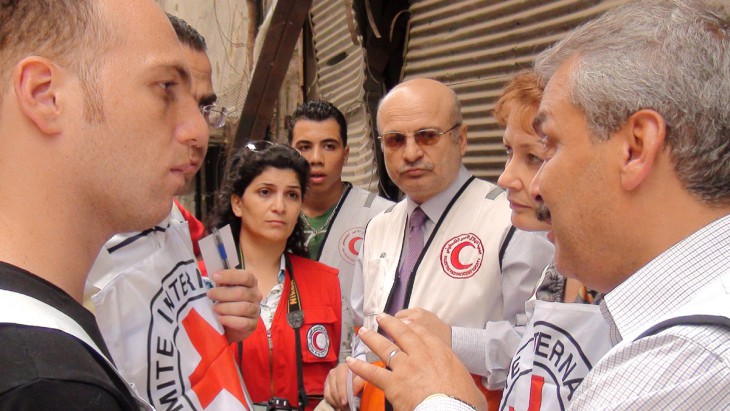
Damascus. Medical personnel from the Syrian Arab and Palestinian Red Crescent Societies and the ICRC confer during a delivery of medicines to Yarmouk camp. © SARC/Muhannad Al Asad
Restoring contact between family members separated by the conflict
The ICRC delegation in Damascus:
- reunited an Iraqi-Palestinian woman with her husband and children in Egypt;
- received 209 tracing requests from people seeking to locate their relatives;
- distributed two Red Cross messages (containing family news only) and nine salamats (oral messages to family members), mainly from Syrians abroad.
For further information, please contact:
Ralph El Hage, ICRC Damascus, tel: +963 930 336 718
Sitara Jabeen, ICRC Geneva, tel: +41 22 730 24 78 or +41 79 536 92 31
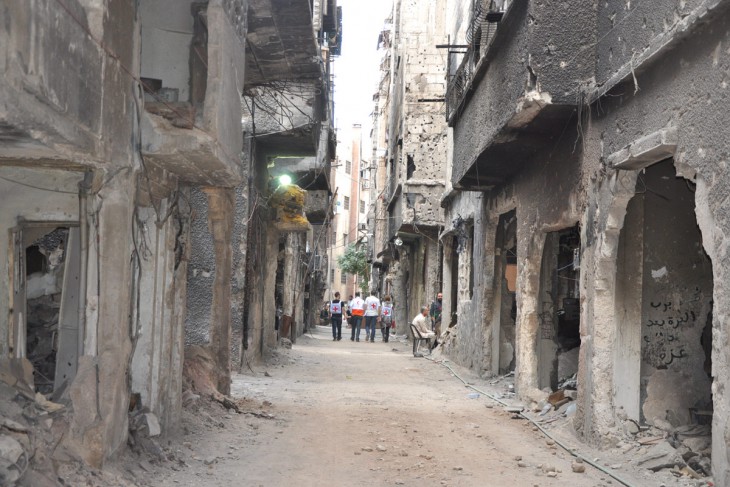
Damascus. Medical personnel from the Syrian Arab and Palestinian Red Crescent Societies and the ICRC walk down the devastated streets of Yarmouk camp. © SARC/Vivian Toumeh

